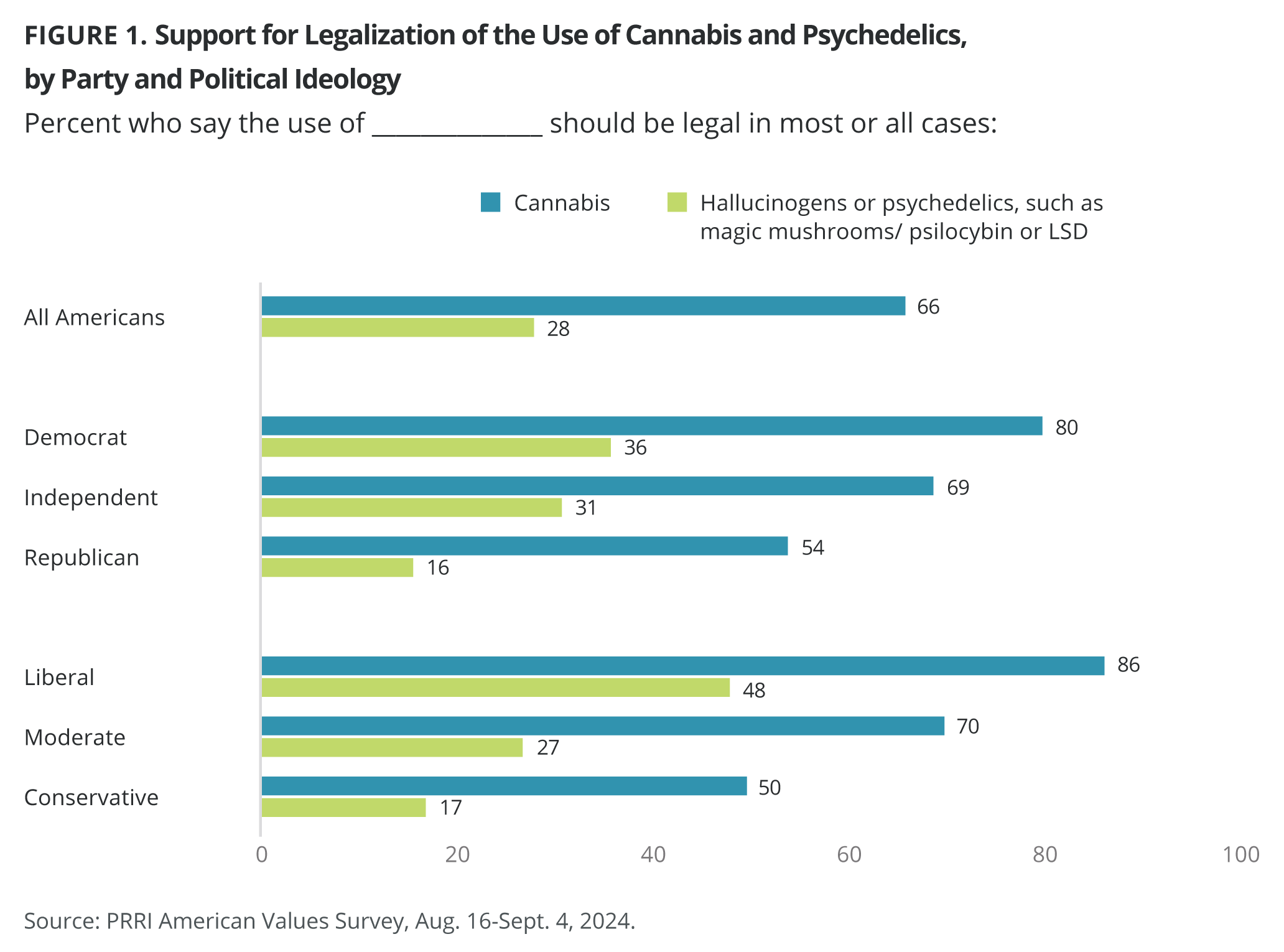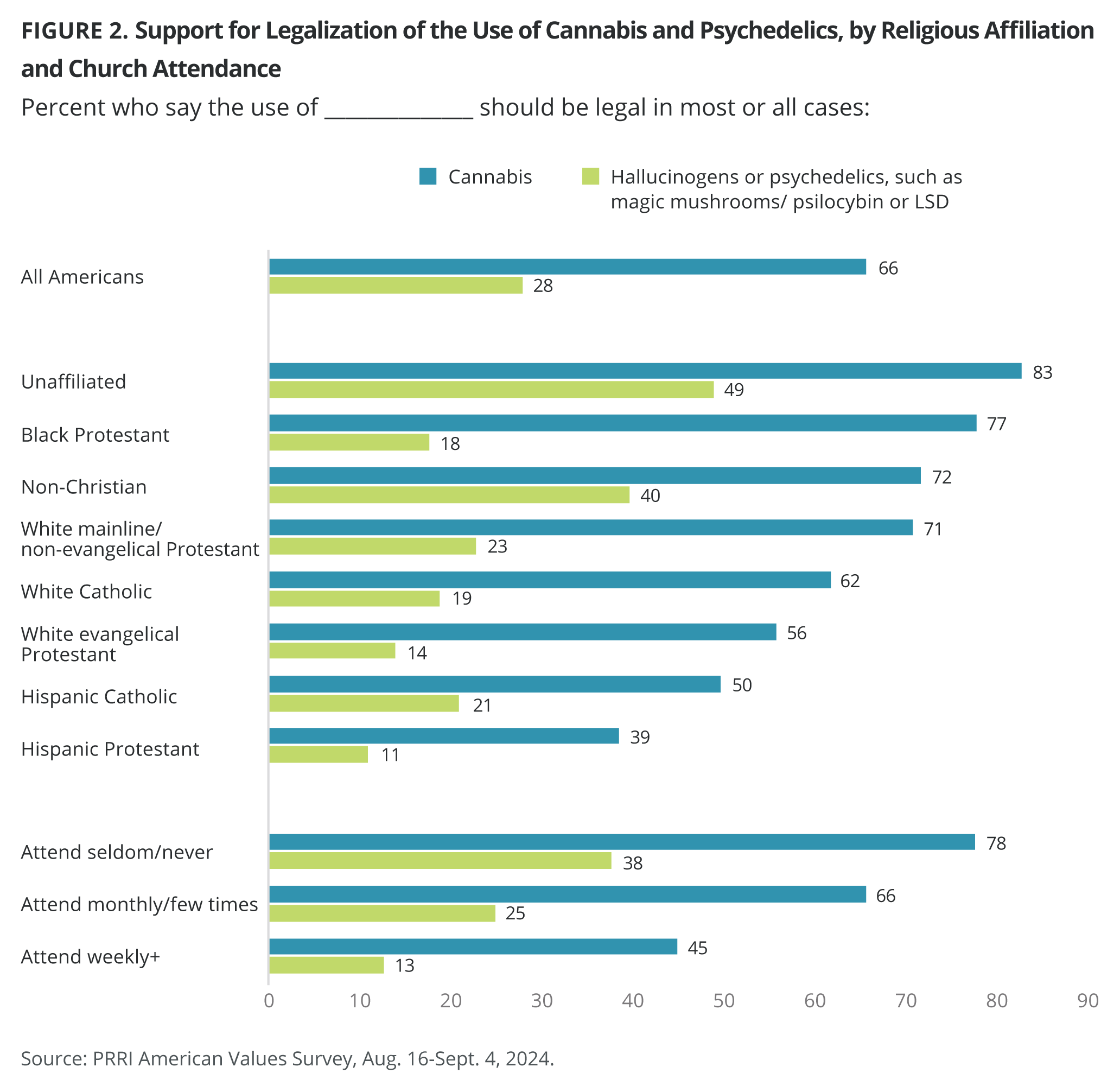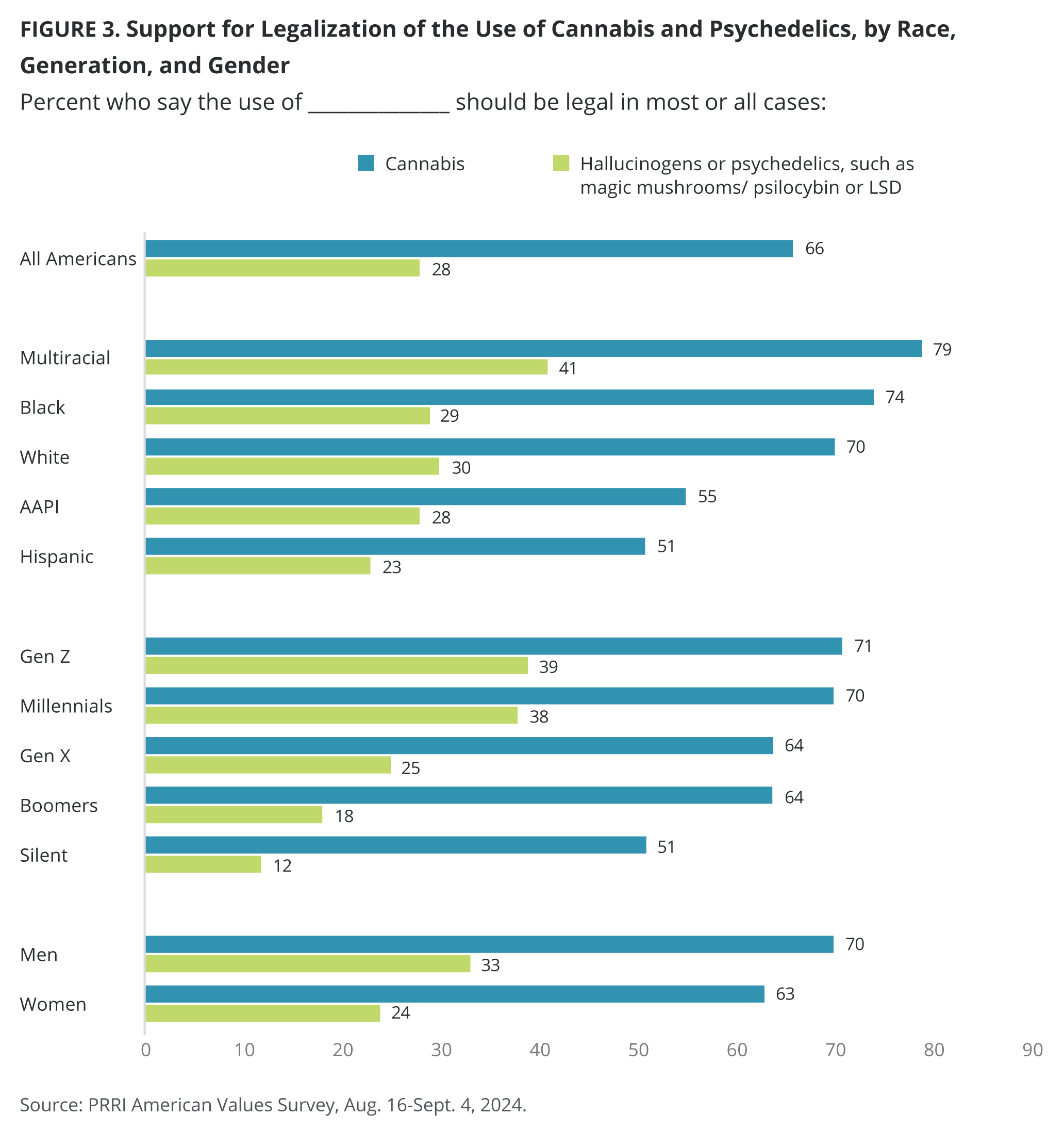In the 2024 election, voters across several U.S. states decided on a range of ballot measures related to drug policy, reflecting the growing national debate around drug decriminalization, regulation, and medical use. These initiatives included measures on the legalization of marijuana for recreational use, the decriminalization of certain psychedelic substances, and expanded access to medical marijuana. The outcomes varied significantly across states. For example, Nebraskans showed strong support for medical marijuana, passing both measures by significant margins, while measures for recreational marijuana legalization were rejected in Florida, North Dakota, and South Dakota. Massachusetts also rejected the legalization of psychedelics. In short, while medical marijuana continues to gain traction, broader legalization of recreational marijuana and psychedelics encountered resistance in several states. This Spotlight examines which Americans are more likely to favor the legalization of cannabis and psychedelics.
The 2024 PRRI American Values Survey shows that Americans are more than twice as likely to support the legalization of cannabis use than of hallucinogens or psychedelics, such as magic mushrooms/psilocybin or LSD in 2024 (66% vs. 28%).
Among partisans, the majority of Democrats (80%), independents (69%), and even Republicans (54%) say that the use of cannabis should be legal in all or most cases. By contrast, four in ten Democrats (36%), one-third of independents (31%), and just 16% of Republicans say the use of hallucinogens or psychedelics should be legal in all or most cases.
Across ideological lines, the majority of liberals say that the use of cannabis (86%) should be legal, along with about half who say hallucinogens or psychedelics should be legal (48%). While the majority of moderates (70%) and half of conservatives (50%) also say that the use of cannabis should be legal, just 27% of moderates and 17% of conservatives say the same about hallucinogens or psychedelics.

Solid majorities across most religious groups say that the use of cannabis should be legal, including 83% of unaffiliated Americans, 77% of Black Protestants, 72% of non-Christians, 71% of white mainline/non-evangelical Protestants, and 62% of white Catholics. Also, a slim majority of white evangelical Protestants (56%) say that the use of cannabis should be legal, along with half of Hispanic Catholics (50%) and four in ten Hispanic Protestants (39%). By contrast, under half of unaffiliated Americans (49%), four in ten non-Christians (40%), and roughly one in four or fewer white mainline/non-evangelical Protestants (23%), Hispanic Catholics (21%), white Catholics (19%), Black Protestants (18%), white evangelical Protestants (14%), and Hispanic Protestants (11%) say the use of hallucinogens or psychedelics should be legal in all or most cases.
Majorities of Americans who seldom or never attend church (78%) or who attend monthly or a few times a year (66%) say the use of cannabis should be legal in most or all cases, compared with less than half of those who attend weekly or more (45%). By contrast, 38% of those who seldom or never attend church, 25% of those who attend church monthly or a few times a year, and just 13% of those who attend weekly or more say the use of hallucinogens or psychedelics should be legal in all or most cases.

Gen Zers are the most likely generation to support legalizing cannabis use (71%) and the use of psychedelics (39%) in all or most cases. While roughly two-thirds or more of millennials (70%), Gen Xers (64%), and baby boomers (64%) support legalizing the use of cannabis in all or most cases, only four in ten millennials (38%), one-quarter of Gen Xers (25%), and two in ten baby boomers (18%) say the same for hallucinogens or psychedelics. Half of the Silent Generation supports legalizing cannabis use, the generation with the lowest support; however, members of the Silent Generation are about four times as likely to support legalizing the use of cannabis as to support legalizing the use of psychedelics (51% vs. 12%).
Most Americans across all racial groups support legalizing the use of cannabis in all or most cases, including 79% of multiracial Americans, 74% of Black Americans, 70% of white Americans, 55% of Asian Americans and Pacific Islanders (AAPI), and 51% of Hispanic Americans. In comparison, 41% of multiracial Americans; about three in ten white (30%), Black (29%), and AAPI (28%) Americans; and 23% of Hispanic Americans support legalizing the use of psychedelics in all or most cases. In addition, men are more likely than women to support the legalization of cannabis (70% vs. 63%, respectively) as well as hallucinogens or psychedelics (33% vs. 24%).
There are no regional differences in support for legalizing the use of cannabis. However, Americans who live in the West (33%) are notably more likely to support legalizing the use of psychedelics than Americans in any other region. Three in ten or fewer Americans living in the Midwest (29%), Northeast (27%), and South (26%) support legalizing psychedelics in most or all cases.

As results from recently passed states’ ballot measures demonstrate, PRRI’s findings reveal a growing acceptance of cannabis use among the American public, while the legalization of psychedelics remains largely unpopular, even among the most liberal groups.




